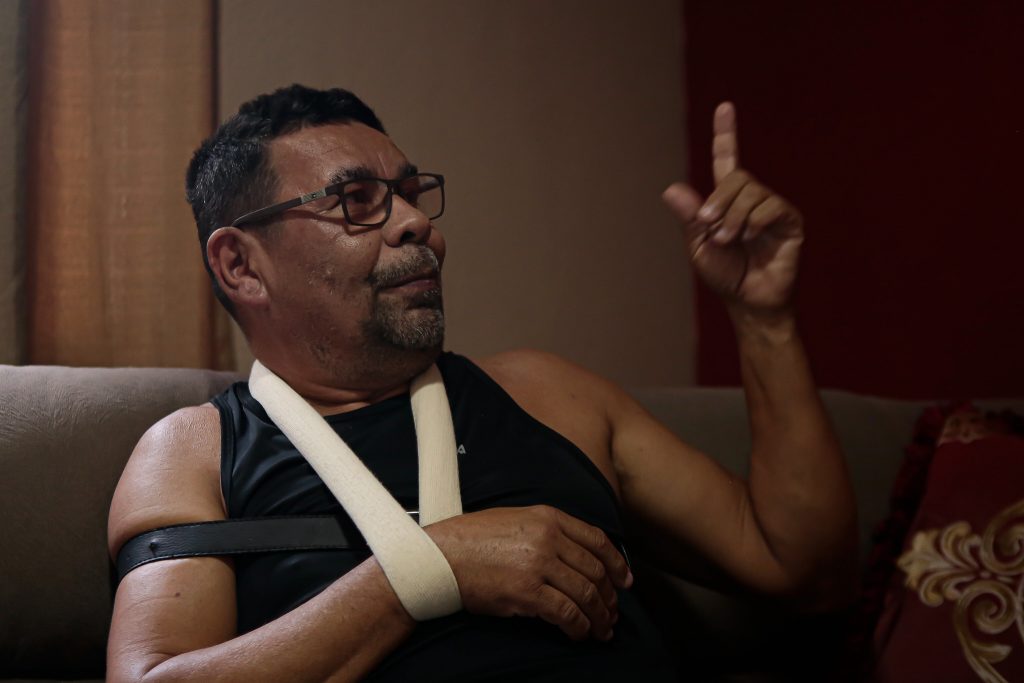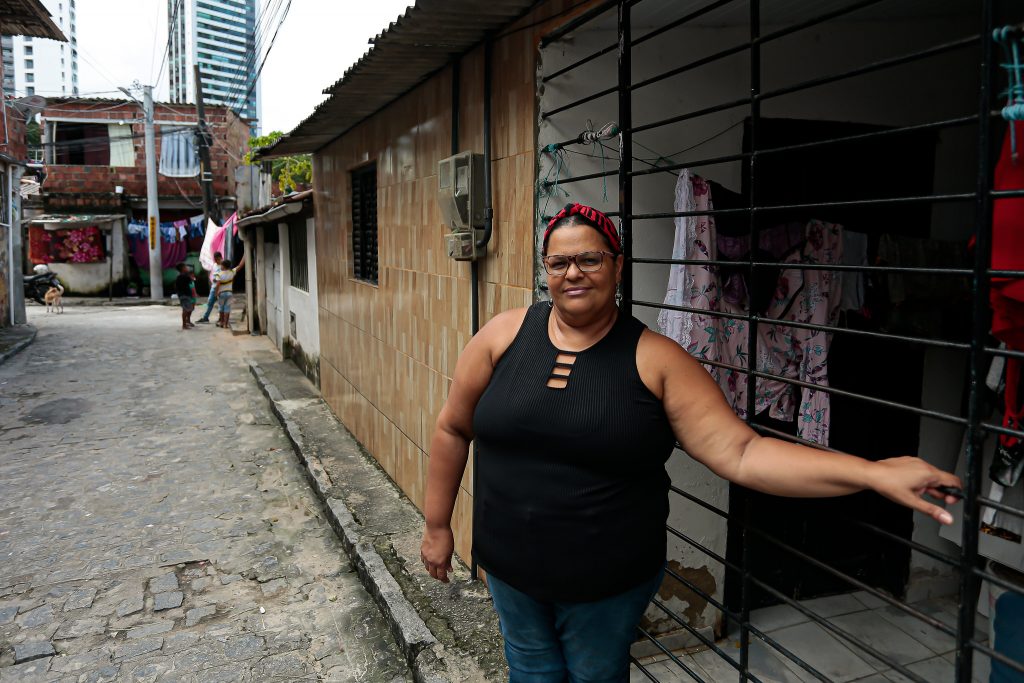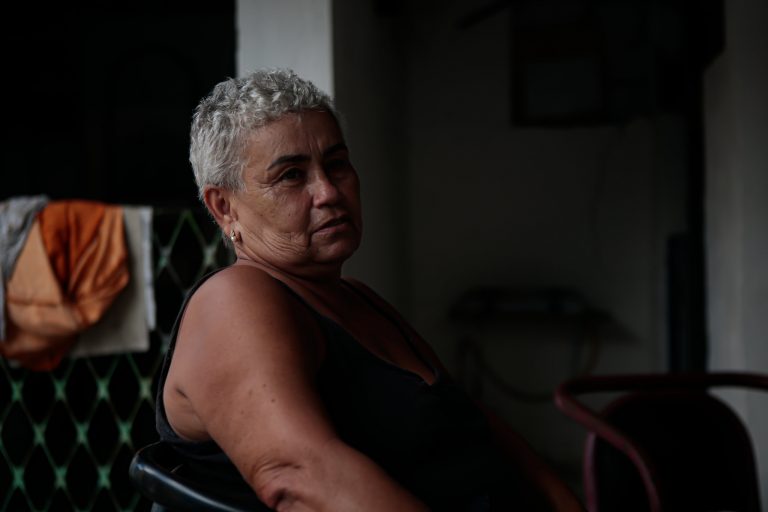Editor’s note: The city of Recife, the capital of Brazil’s Pernambuco state, plans to remove 53 houses from a local community to build a bridge in one of the city’s upscale areas. Residents from Esperança (Hope) Village are mobilized to stay and preserve their memories.
Photos: Arnaldo Sete
Read the original story in Portuguese
The house where they grew up, the school they attended, the neighbors and friends they made and the streets that served as host to their parties: for most people, places are connected to cherished memories. When the forces of urban development and gentrification push for change, threatening those memories, some communities decide to fight back. That is the case for Esperança Village, a community in Recife, Brazil, which is scheduled to be demolished to give way to a bridge.
Recife city plans to remove the community, which is located in the Monteiro neighborhood, an upscale area in the north of Recife, to build a bridge over a stretch of the Capibaribe River, connecting the neighborhoods of Iputinga, in the west, and Monteiro. According to the Recife Urbanization Authority (URB in Portuguese), the project depends on the expropriation and demolition of 53 properties in Esperança Village.
Out of fear of losing their homes, residents now are mobilized to demand that mayor João Campos revoke the decree from May 2021 that determines the total expropriation of the area.

Local history at risk
Surrounded by high-end buildings, newly built or still under construction, there’s a quiet street where children, the elderly, and pets divide space on the sidewalk. Esperança Village rests right behind the walls of Public School Silva Jardim.
It was a Thursday when we visited the community. The sun had come back after several days of rain, and resident Maria Helena Vicente agreed to guide us around the community.
Wellington Lira, a 57-year-old resident who has lived in the community for over five decades, was the first one she introduced to us. “Here there’s a silence that is so delightful, isn’t it?” he said. “My whole childhood was here. When we talk about it, it seems I see a film playing,” Lira told us while looking to the horizon.
Before being called Esperança, he recalls, the community was known as “Temporal’s Island” street. And there was a history behind the name. “We had a place, a large area with a wonderful lawn, where people would come for a picnic. These houses are centuries old, they are houses built by the slaves in the time of the Dutch. We used to live here as tenants of a person called Temporal. From there came the name of the street, from the owner Nelson Temporal who would come here every month to collect the rent. Suddenly, that person was gone, and we wouldn’t have to pay rent here anymore. That’s when Vila Esperança was formed in the 1980s. We became a community and continued to grow”.
According to the resident, in the 1980s, there were already talks about building a bridge in the area, but this is the first time that he feels threatened by the project. “Most of the people don’t want to leave. Where should we go?” he asks. “We will not be able to buy a house in a nice area like this one with the money we will receive from the city. We are being dragged out.”

Lira says the project originally started in 2012, but it was suspended. At that time, 24 families living at the banks of the Capibaribe river were removed from their homes. Of them, 16 live now in a city housing condo built inside Esperança Village, and others receive a monthly financial aid of R$ 300 (US$55).
Maria Corina Santana is one of the residents of the city condo. She says that moving to the building brought more quality of life to her family. But she does not own the apartment where she has lived for over 10 years, which concerns her. “I am very afraid I’ll also be removed from here with this bridge’s construction because it would be very close to us, over my home.”, she says. “And it will displace the whole community. How so that they will take everybody out and I will stay here? Nobody told me anything yet, but it is obvious that the project will affect the city housing as well.”
She says the city had promised to build another building to house families displaced in 2012, but it has not happened yet.
Now, the Esperança residents fear that the community will soon hear the same false promises.
“Last year, we were surprised when they resumed the bridge’s project. We only found out when city officials arrived with a spray marking our houses, without any prior communication”, says Lira.
The Engenheiro Jaime Gusmão bridge’s construction began in 2021 and is expected to be completed in two years, at BRL 38 million (US$7 million.)
Lira believes the bridge project could be carried out in a simpler way: “You don’t have to remove these houses. You can build this bridge, this ring road, in another area, in another street. It [the bridge] can go out on Pinto de Campos Street [also in the Monteiro neighborhood], for example, and it would only affect three properties.”
“And what about the feelings?”
Resident Patrícia Fernandes was leaving home for an appointment when she met us, but she wanted to stop to vent about her anguish. “I feel sick with what is happening because here is a good place, a safe place. It’s a community where people have compassion for others; we feel like family. And they want to remove us and put us in an unknown place. How can we know if we will feel welcomed in that other place or if we will face violence?” she asked.
Fernandes agreed the city’s mobility is important. “But what about the people? We are below the projects, right?” she said. “They want to remove several families who are settled down; they want to change our lives, our present, and our past, so a bridge can exist, without thinking of the people here. I think this is unacceptable.”

(Photo by Arnaldo Sete/Marco Zero)
While we were talking, Fernandes stopped to comfort her neighbor Regina Célia for losing a relative. “And what about the feelings, my people? Our children were born and raised here. It’s awful to think about it because we have been together for years, everybody together. There are many years of friendship, we feel each other’s pain like ours”.
She has lived in the community for 30 years and believes the lack of dialogue and the low financial compensation offered to their houses are signs of the public authority’s lack of empathy and negligence toward the local community.
“They [city hall] are paying very little because we may live in a small area, but it is our home, our history. The money they are offering is just enough to buy a house on a hill. So, do you know what will happen? We are going to die, as happened with many families who died with the landslides following the rains, because of their irresponsibility”, she says, summarizing the issues caused by the lack of housing policy in the capital of Pernambuco.
The Esperança Village residents do not have ownership over the houses because the community is classified as a Special Zone of Social Interest ( Zeis), an area designed for housing and social development. The main characteristics of a Zeis are rules protecting occupation rights to avoid kicking out residents and real estate speculation. “Some people have accepted the deal with the city because they do not have the knowledge that they can stay; we have rights ensured by the “Zeis”, Lira says.
When we asked the City Hall if the bridge project violates the social function ensured by the Zeis, the URB responded that “there were meetings with residents and community representatives to present the project.” They’ve also mentioned that they have promoted two public hearings in which they provided clarifications about the project and another public presentation at the Silva Jardim School. “Since the beginning of the process, all deliberations are being carried out by URB in common agreement with the landlords.”
Anxiety and Depression
Raquel Dalzy, 64, is Esperança Village’s oldest resident. She is the only one who has ownership papers of her house because, 30 years ago, she filed a lawsuit for adverse possession, a legal process whereby a non-owner occupant of a piece of land gains title and ownership of that land after a certain period of time.
A retired teacher, Dalzy told us her mom arrived in the community years before she was born, and the family has remained in the property since then. She currently lives with her husband and a granddaughter in a well-equipped house. The place often hosts family parties and gatherings. But their beloved home has become a source of concern.
“I wish I could take the home and go to another place because I like it so much,” she said.

Her last visit to the city hall to discuss the removal was in November 2021. She says the process has made her sick. “The city comes much hard on us, almost imposing, like: ‘you have to leave!’. I know it’s not like that, but we are scared,” she says. “The day I went there to listen to the city’s proposed compensation, I got very nervous. They don’t tell us directly, but it seems they are trying to say that if we don’t leave, a tractor will go over our houses. It’s nerve-racking,” she says, detailing she fell into depression as a result of this. “I’ve just recovered recently.”
She is also sad to see her neighbors leaving the community, the street being emptied. “Recently, my front neighbor left. Each person does what they want, of course, but this makes us feel weaker. It seems hard to believe it (that the community can stay). We are with tied hands seeing they (the city) doing what they want. Young people like my daughter do not imagine what that means to live here for so long.”
According to Recife Urbanization Company, 26 of 53 residents have already agreed with the deal and decided to leave their homes.
At 64, all Dalzy wanted was to enjoy a quiet retirement in her home. “I don’t want to leave for any money,” she says. “But if I really would have to leave, I wanted to receive a fair money to be able to buy a dignified house like this one I have,” she says. The first compensation offer she received from the city for her house, according to her, was half of the market value.
A community mobilized
On June 13, residents held a protest close to Silva Jardim school. In the demonstration, which blocked the traffic in the city north region for about one hour, they asked for the revocation of decree nº 34.603 and the regularization of the community.
A resident’s commission took the case to the Pernambuco Prosecutor’s Office and Public Defense, requesting access to all documents from the bridge executive project. They also want to prevent their houses from being taken down. According to the residents, despite scheduling meetings, the city is not open to negotiating since the requests are ignored.

One of their demands is that the city ensures the promised housing for families that are being removed. “It does not make sense they only deliver the housing condo only after the bridge is built. We want it as soon as possible so it would be an assurance, at least”, Lira says.
We requested URB access to the full bridge project, but they sent us an email explaining that the bridge project includes building parks, bike paths, and a street with four street lanes. The full note, in Portuguese, is available here.
The residents from Esperança Village have reaffirmed they are not against the improvements, but they wish it could be done differently. “I know progress has to come, but it should be a more fair and more human way to do this,” Dalzy dreams. Honoring its name, Esperança Village doesn’t give up hope.
Giovanna Carneiro and Arnaldo Sete are Report for the World corps members with Marco Zero in Recife, Brazil.

































